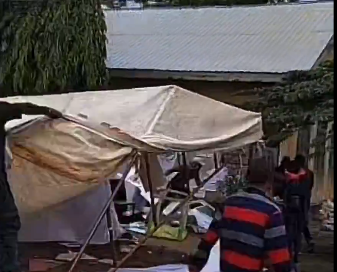Protests have erupted in Tanzania, with young people destroying polling stations.
They are expressing their grievances against the elections, where President Samia Suluhu is expected to run without much opposition.
In a video seen by Uzalendo News, protesters are seen dismantling a tent at a polling station and carrying away chairs.
“Hiki ni kituo cha kupigia kura. Hamna kupigia kura hapa (This is a polling station. There is no voting here),” a man is heard saying.

In other polling stations, the turnout has been reported to be low.
International observers, including representatives from the African Union, SADC, the EAC and the Great Lakes region, are monitoring the process.
President Samia Suluhu took over the top office following the death of former President John Magufuli.
Suluhu was Magufuli’s deputy president then.
The ruling party, Chama Cha Mapinduzi (CCM), has maintained power in every election since Tanzania adopted multi-party politics in 1992.
Despite CCM’s dominance, election seasons have traditionally been marked by lively campaigns and spirited exchanges among competing parties.
In this year’s race, the electoral commission has cleared 17 presidential candidates, but the main opposition party, Chadema, remains barred from participating.
Its leader, Tundu Lissu, is currently facing treason charges after his April arrest, which came shortly after he called for electoral reforms.
The party has since urged its supporters to boycott the vote in protest.
Chadema’s deputy leader, John Heche, was also detained.
Speaking to the BBC before his arrest, he dismissed President Samia’s political reforms as superficial, saying that although rallies had been permitted again, opposition parties still faced restrictions that made their work impossible.
Meanwhile, Luhana Mpina, the presidential candidate from ACT Wazalendo, Tanzania’s second-largest opposition party, has also been struck off the ballot twice.
His candidacy was briefly reinstated by the High Court after an initial disqualification over procedural grounds, but the Attorney General’s appeal led the electoral commission to uphold his exclusion.
This has prompted some voters to boycott the would-be democratic exercise.
Speaking to BBC, Dar es Salaam resident Godfrey Lusana said he will not be casting his presidential vote.
“We do not have an election without a strong opposition. The electoral system is not independent. We already know who will win. I can’t waste time voting,” he told the BBC.
“If the electoral commission were really independent, I would have voted.”